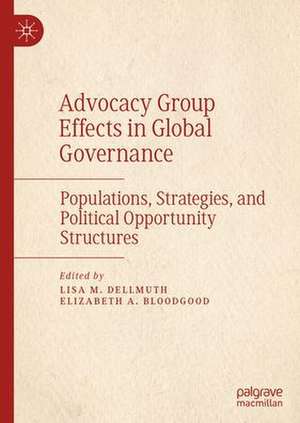Advocacy Group Effects in Global Governance: Populations, Strategies, and Political Opportunity Structures
Editat de Lisa M. Dellmuth, Elizabeth A. Bloodgooden Limba Engleză Hardback – 17 oct 2023
Preț: 786.98 lei
Preț vechi: 959.72 lei
-18% Nou
Puncte Express: 1180
Preț estimativ în valută:
150.59€ • 157.95$ • 125.36£
150.59€ • 157.95$ • 125.36£
Carte tipărită la comandă
Livrare economică 01-15 aprilie
Preluare comenzi: 021 569.72.76
Specificații
ISBN-13: 9783031278631
ISBN-10: 3031278631
Pagini: 344
Ilustrații: XVIII, 344 p. 23 illus.
Dimensiuni: 148 x 210 mm
Greutate: 0.59 kg
Ediția:1st ed. 2023
Editura: Springer Nature Switzerland
Colecția Palgrave Macmillan
Locul publicării:Cham, Switzerland
ISBN-10: 3031278631
Pagini: 344
Ilustrații: XVIII, 344 p. 23 illus.
Dimensiuni: 148 x 210 mm
Greutate: 0.59 kg
Ediția:1st ed. 2023
Editura: Springer Nature Switzerland
Colecția Palgrave Macmillan
Locul publicării:Cham, Switzerland
Cuprins
Chapter 1. Advocacy group effects in global governance: populations, strategies, and political opportunity structures Lisa M. Dellmuth and Elizabeth A. Bloodgood.- Chapter 2. No borders, no bias? Comparing advocacy group populations at the national and transnational levels
Joost Berkhout and Marcel Hanegraaf.- Chapter 3. NGO participation in global governance institutions: international and domestic drivers of engagement Laura A. Henry.- Chapter 4. When do refugees matter? The importance of issue salience for digital advocacy organizations
Nina Hall.- Chapter 5. Taking control of regulations: how international advocacy NGOs shape the regulatory environments of their target countries Andrew Heiss.- Chapter 6. Competition and strategic differentiation among transnational advocacy groups Mette Eilstrup-Sangiovanni.-
Chapter 7. Correction to: Lobbying the lobbyists: when and why do policymakers seek to influence advocacy groups in global governance?Kirsten Lucas, Marcel Hanegraaff and Iskander De Bruycker.- Chapter 8. The stakes of global venue shopping: examining bank lobbying in the Basel Committee and the European Union Adam William Chalmers and Adela Alexandra Iacobov.-
Chapter 9. Transnational partnerships’ strategies in global fisheries governance
Matilda Tove Petersson.- Chapter 10. Close cousins or false friends? Studying interest groups and INGOs Darren R. Halpin.- Chapter11. Civil society and global governance: Exploring transscalar connections Jan Aart Scholte.
Notă biografică
Lisa M. Dellmuth is Professor of International Relations at the Department of Economic History and International Relations, Stockholm University, Sweden.
Elizabeth A. Bloodgood is Associate Professor in the Department of Political Science, Concordia University, Canada.
Textul de pe ultima copertă
Since the end of the cold war, advocacy groups have proliferated and enjoyed increasing access to global governance institutions such as the European Union, Marine Stewardship Council, United Nations, and to partnerships between such institutions. This book seeks to push theories of interest groups and international non-governmental organizations forward. It argues that the advocacy group effects on global governance institutions are best understood by examining how groups use and shape domestic and global political opportunity structures. It examines how, when, and why domestic and global political opportunity structures shape advocacy group effects in global governance, across global institutions, levels of government, advocacy organizations, issue areas, and over time. As special interests are becoming increasingly involved in global governance, we need to better understand how advocacy organizations may impact global public goods provision.
Caracteristici
Advances theories of interest groups and international non-governmental organizations Assesses how groups use and shape domestic and global political opportunity structures Helps us better understand how advocacy organizations may impact global public goods provision
